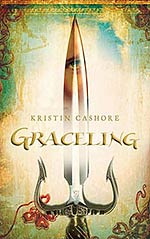
![]() Rhetori_Cat
Rhetori_Cat
1/21/2013
![]()
Kristin Cashore's debut novel Graceling was published in 2008, about two and a half weeks after Suzanne Collins's The Hunger Games. I make a point of saying this if only to remind myself that there is very, very little possibility that the novels are actually in conversation with each other, and instead they are perhaps reflecting larger cultural shifts. I read Graceling as part of the Worlds Without End Women of Genre Fiction Reading Challenge (henceforth the WoGF) since Cashore had been on my radar for a while, but I hadn't actually read any of her work. I pretty much inhaled the novel; I read about half of it last night while I should have been reading for class, but no regrets.
The Plot: Katsa is the orphaned niece of King Randa and his number one thug. Possessing superhuman abilities, called her Grace, Katsa can kill pretty much anyone or anything with ease; unfortunately, she discovers her power by inadvertently killing an adult cousin when she was six years old because she did not want the man to touch her. Disgusted by her role as Randa's enforcer throughout the seven kingdoms, Katsa organizes the Council, a group of individuals from lords down to servants who seek to protect citizens in all kingdoms from the power-hunger of their kings. Through her work for the Council, Katsa meets Po, a Graced fighting prince from the peaceful island of Lienid who searches for his kidnapped grandfather. After refusing to do Randa's dirty work any longer, Katsa removes herself from the court and travels with Po as he seeks more information about his grandfather's disappearance. What they discover is the underhanded work of the supposedly kind and beneficent King Leck of Monsea, who is himself Graced with the ability to fog people's mind with his words and make them remember events as he chooses. Po and Katsa's goal becomes saving Leck's daughter Bitterblue from her sick, twisted, perverted, evil father.
So, a few quick notes on things that I could harp on and on about -- but won't -- and then onto the things that I thought were really interesting.
So much for that. What I thought was best and really interesting about this book was the way it constructs sex. Throughout the novel, Katsa continually claims that she never wishes to marry and she never wishes to have children. One suitor, upon hearing this, claims that of course she'll want children eventually because all women do. I really sympathized with Katsa on this point, seeing as I've heard the same line a few times myself. Moreover, Katsa's desire to not marry is culturally situated; as soon as she marries, she will have wifely obligations, and she doesn't want to have to serve anyone but herself, and given her long tenure under Randa, the reader can understand her want of independence. (Interestingly, Katniss of The Hunger Games also claims to never want children for equally political reasons: she does not want to produce fodder for the Capitol's games. However, SPOILER ALERT she does relinquish because of Peeta's own desire for children, and I'm interested to see how Cashore deals with this same issue in subsequent books, given that she's taken a much more feminist stand concerning inherent motherliness in women in Katsa's choice than Katniss perhaps made in hers.)
So what happens is this: Po and Katsa fall in love (of course). Katsa kind of hates it because it means that she wakes up in the night afraid he won't be there instead of being completely sufficient within herself. She wrestles with it and tells Po that it's all futile because she will never marry and they should really just part ways so they don't have to deal with their feelings all the time. Po tells her that they can be more than friends but less than married, and oddly enough, Katsa had never considered just taking a lover (I'm guessing because of societal constructs that discouraged women from knowing about such things so they wouldn't do it). However, instead of being swept away in a fit of passion, Katsa dwells on it a few days, making sure of her own choice, and then, after guaranteeing that they have a form of birth control, she chooses to have sex with Po. And I loved it: the thorough forethought, the arrival at a decision, the conscious responsibility -- it's a model that I wish we saw more of.
The other thing that really struck me as I was reading was the theme of female survivorship. Katsa is extremely good at surviving, and she frequently takes it upon herself to protect other girls, especially from male predators. That her Grace manifests itself when she feels threatened by the untoward advances of her cousin is notable considering what she and Po save Bitterblue from, and Katsa is frequently appalled by the fact that women need to be most able to protect themselves but are taught nothing about fighting or surviving by those who claim to be protecting them. Her choice at the end to hold fighting schools for girls throughout the seven kingdoms suggests that this will be a theme explore in the sequels. At the same time, the novel has little to say about the trauma of abuse (Bitterblue copes quite well in her stoicism) or about structural changes that might bring about greater safety for women.
Overall, I enjoyed Graceling even if I wasn't blown away by it. I'd like to continue my comparison with The Hunger Games Trilogy; I'm interested to see how Cashore develops some of these themes throughout subsequent books.
http://speculativerhetoric.wordpress.com/2013/01/16/graceling-evil-rhetors-and-female-survivors/